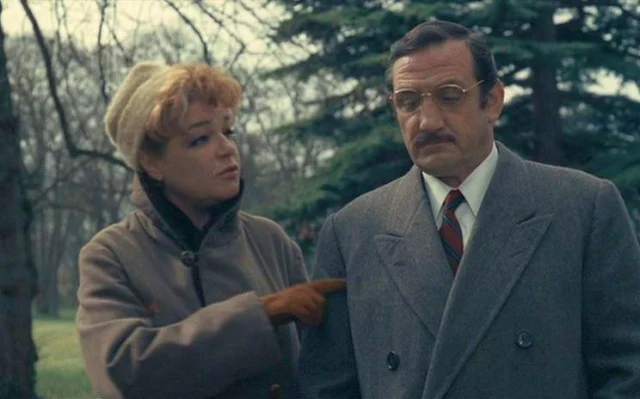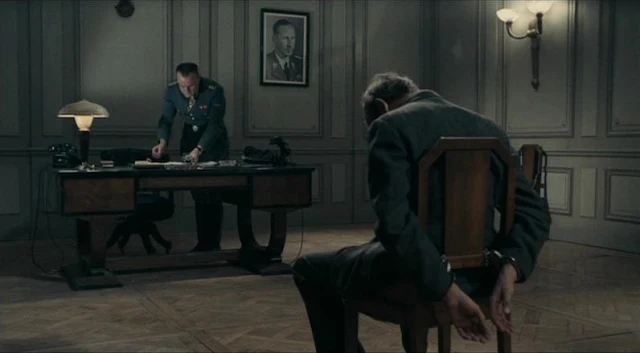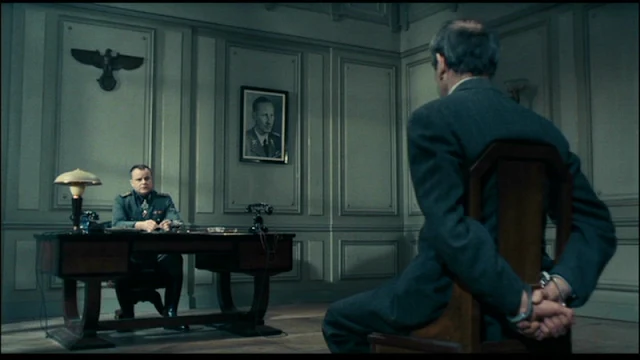Anna Silver: Aurore Clément
Heinrich Schneider: Helmut Griem
Ida: Magali Noël
Hans: Hanns Zischler
Anna's mother: Lea Massari
Daniel: Jean-Pierre Cassel
Director: Chantal Akerman
Screenplay: Chantal Akerman
Cinematography: Jean Penzer
Storytelling is all about information -- what's disclosed and what's concealed, what's shared and what's withheld. It's a kind of tease: How much can you let an audience know and how can you keep them guessing? Usually, but not always, the first bit of information a storyteller gives the audience is a title -- what the story is about.
Les Rendez-vous d'Anna is about as straightforward as a title gets: Chantal Akerman is about to tell us a story about someone named Anna and her meetings. Beyond that, it's a matter of waiting for more information. The film starts with a long take, carefully framed as Akerman's shots usually are, almost symmetrical, rigidly squared off: a railroad platform with an opening for stairs leading down to an
Ausgang, an exit. There are train lines to the left and the right, and beyond the opening for the stairs there is a telephone booth in the center of the frame, though the placement of the telephone booth doesn't draw special attention to it -- we barely recognize it for what it is until it's in use. The platform is open, so that we can see a bit of the urban distance, but there are no people in sight. We wait, and wait, until finally we hear a train approaching. It pulls to a stop on our right, and soon people appear, apparently having descended from the train somewhere behind the camera, and begin to enter the stairwell. One person, a woman, detaches herself from the crowd and walks beyond the opening to the telephone booth where we see her, from a distance, make a call. The train leaves and soon she emerges from the booth and comes toward us, then turns and descends the stairs. And that's all the information you get in the first two or three minutes of the film. We don't even know where we are yet; we assume that it's a city in Germany, but it could also be Austria or Switzerland.
Akerman's films have sometimes been unfairly likened to "watching paint dry," mostly because she seems to feel no urgency to tell us the story. She leaves it to us to glean whatever we can from her long takes, not zooming in or cutting to closeups to give us a sense of what may be important in a scene. Eventually we will learn that the train station is in Cologne, Germany, and that the woman is Anna Silver, a filmmaker who has come there for the premiere of one of her films. We don't know whom she has called, but it's a good guess that it was to arrange one of her meetings, the first of which is with a German who goes back to her hotel with her after the screening. They make love, but Anna tells him she doesn't want to make the relationship more permanent. The next day, he says, is his daughter's birthday, and he wants Anna to visit his home, which he shares with his mother and his daughter. During the visit, he tells her about his life, about wartime hardships, about his wife's running away "with a Turk," and much else. (A good deal of the film's subtext concerns Europe in the recession-haunted late 1970s.) At the end of their meeting, we realize we know more about him than we do about Anna herself.
Aurore Clément plays Anna as an enigmatically dispassionate woman, someone whom people confide in almost as if they're filling the silence that surrounds her. Over the course of the film she spends almost as much time silently looking out of windows as she does in actual encounters with other people. She has four more "meetings" -- with one of her mother's friends, with a stranger she encounters on a train, with her own mother, and with a lover in Paris. By the end of the film we have learned only snippets of information about Anna, including the fact that she has had a relationship with a woman in Italy, whom she tries to call several times during the days she spends in Cologne and Brussels before her return to Paris, where she currently lives. Her life is a rootless one: In the last scene, she listens to the messages on her answering machine, one of which tells her that she has more meetings the following week in several cities in Switzerland.
The title is accurate: This is a film about meetings, none of them especially conclusive, and none resolving into anything of permanence.
Les Rendez-vous d'Anna is, like Akerman's
Je Tu Il Elle (1974) and
Jeanne Dielman, 23 Commerce Quay, 1080 Brussels (1975), a test of a viewer's patience, of one's willingness to sort through the information presented and to assemble it into something that coheres. But also like them, it's a film that rewards the effort, by sharply reordering one's expectations of what a film can be, how it can illuminate the nature of ordinary exchanges with other people, how it draws attention to the mysteries of the self, and how it can linger in the memory more durably than less demanding ones.
Watched on Filmstruck Criterion Channel


















